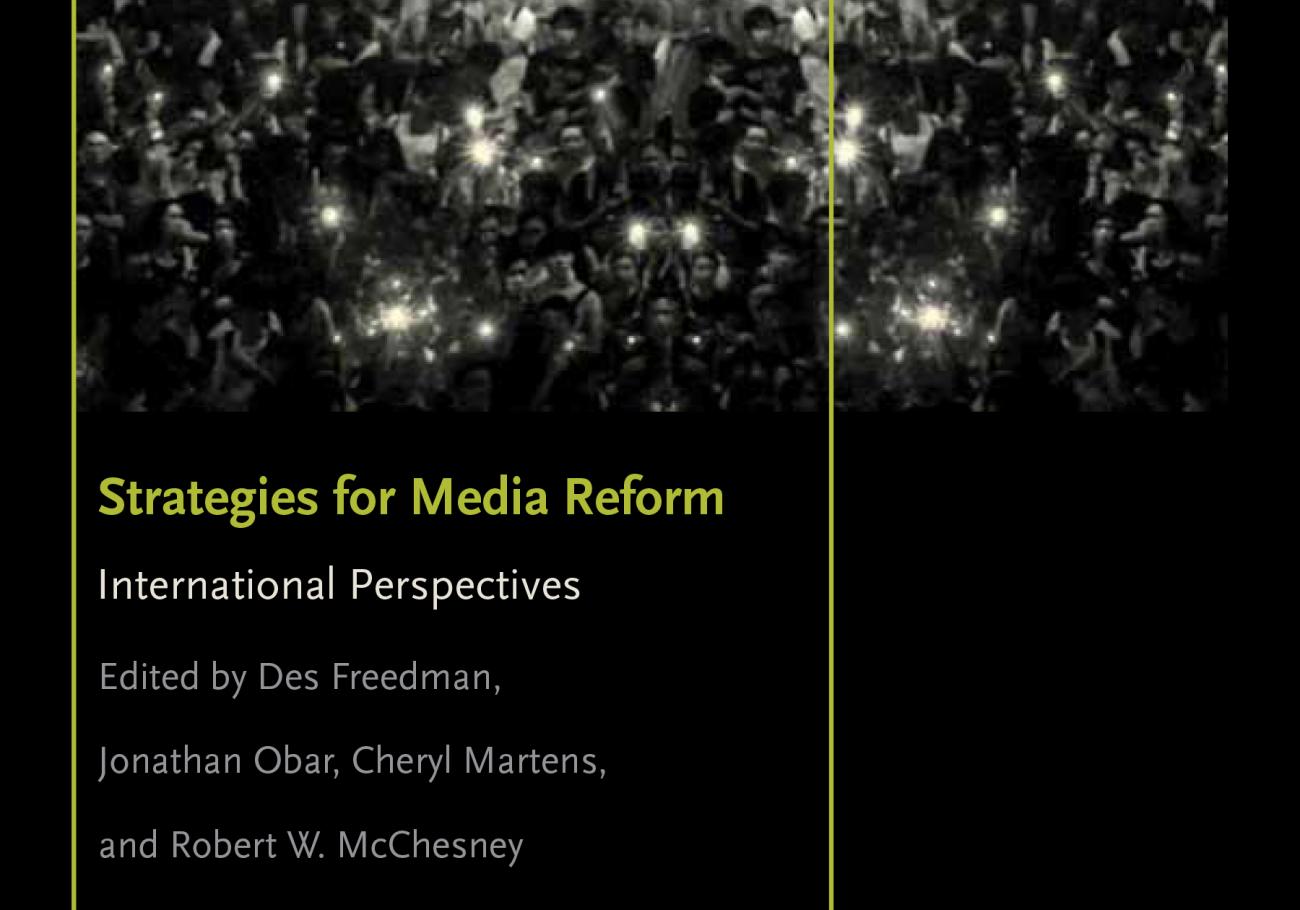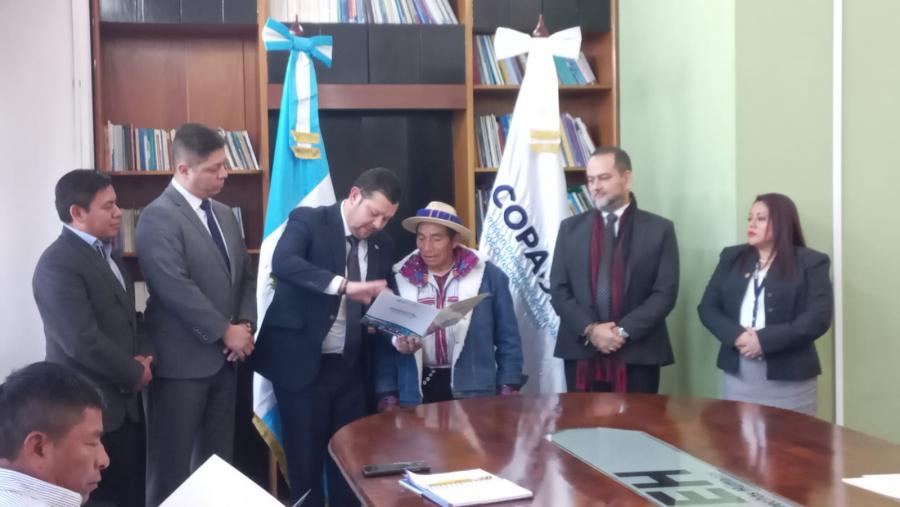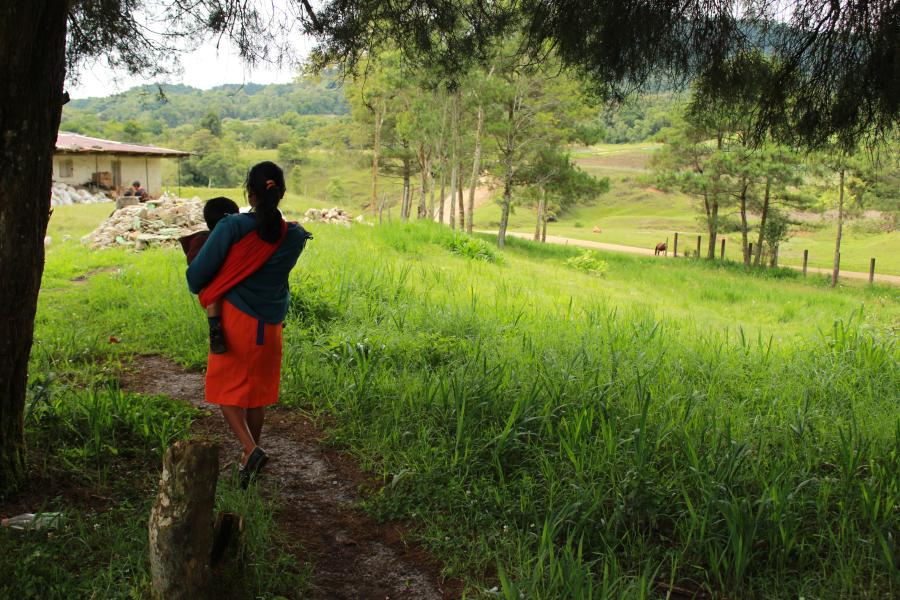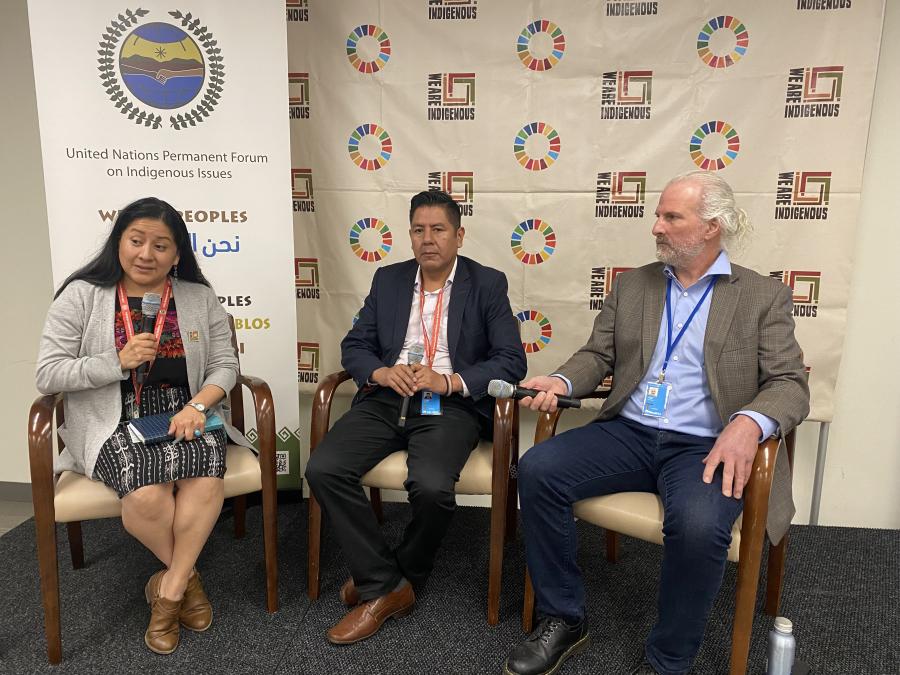
By Mark Camp, Cultural Survival
Published in Strategies for Media Reform International Perspectives Edited by Des Freedman, Jonathan Obar, Cheryl Martens, and Robert W. McChesney. (2016. Fordham University Press)
MEDIA REFORM STRATEGY
The use of community radio by Indigenous Peoples in Guatemala is a vital source of self- expression. In the light of the continuing refusal of Guatemalan governments to provide Indigenous communities with legal access to community radio stations, the use of legal challenges together with the emergence of citizen- based low- power FM stations mounts pressure for reform. These activities have been complemented by intensive lobbying by local residents for constitutional change and the presentation of a petition that is currently being considered by the InterAmerican Commission for Human Rights (IACHR) of the Organization of American States. Th e legalization of community radio is a crucial battle for freedom of expression for Indigenous groups and an increasingly salient issue for Guatemalan citizens.
Cultural Survival envisions a future where all Indigenous Peoples live by their inherent rights deeply and richly interwoven in their aboriginal lands, native languages, spiritual traditions, and dynamic cultures; and where Indigenous rights are honored through self- determination. Cultural Survival advocates for the rights of Indigenous Peoples and supports Indigenous communities in their self- determining work for cultural and political survival.
The impulse for the founding of Cultural Survival arose during the 1960s with the opening up of the Amazonian regions of South America and other remote regions elsewhere. As governments all over the world sought to extract resources from areas that had never before been developed, the drastic eff ects this trend had on the regions’ Indigenous Peoples underscored the urgent need to defend the human rights of these victims of progress. Today, the organization promotes the rights of Indigenous communities around the globe. All of the work is predicated on the United Nations Declaration on the Rights of Indigenous Peoples. In 2007, after twenty- five years of negotiation, the UN General Assembly adopted the Declaration on the Rights of Indigenous Peoples. This document, which was created by Indigenous representatives working with government representatives, is the fundamental document spelling out the distinctive rights of Indigenous Peoples. Th ese include the right to live on and use their traditional territories; the right to self-determination; the right to free, prior, and informed consent before any outside project is undertaken on their land; the right to keep their languages, cultural practices, and sacred places; the right to full government services; and, perhaps most signifi cant, the right to be recognized and treated as peoples. Cultural Survival partners with Indigenous communities to defend their lands, languages, and cultures. We assist them in obtaining the knowledge, advocacy tools, and strategic partnerships they need to protect their rights. When their governments don’t respond, we partner with them to bring their cases to international commissions and courts, and we involve the public and policy-makers in advocating for their rights. In addition, Cultural Survival off ers the most comprehensive source of information on Indigenous Peoples on the planet. Our award- winning magazine, the Cultural Survival Quarterly, has been published for almost forty years.
A SOMEWHAT SUCCESSFUL MEDIA REFORM STRATEGY
The United Nations celebrated the International Day of the World’s Indigenous Peoples in 2013 by shining “a spotlight on indigenous media—television, radio, film and social media—and their role in helping preserve indigenous cultures, challenge stereotypes and infl uence the social and political agenda.”
The role that media play in protecting indigenous peoples’ rights to freedom of expression— which includes the right to seek, receive, and impart information, culture, and participation—is recognized not only by the larger international community but also by the inter- American human rights system. Community radio, as a form of media, is a valuable tool to educate children, linked to the preservation of language and culture, and promotes democracy by advancing participation and nondiscrimination. Despite this recognition of the value of indigenous community radio and the obligation on states to protect indigenous peoples’ rights to freedom of expression and culture, the Republic of Guatemala continues to deny access to its indigenous peoples of this form of media. In the seventeen years since the Agreement on Identity and Rights of Indigenous Peoples (AIDPI) in which Guatemala agreed to provide Indigenous Peoples with access to radio as a medium of expression, numerous attempts have been made to amend Guatemala’s current law which does not provide for community radio of any kind.
These efforts have been unsuccessful and today, instead of being closer to that goal, Guatemala’s Congress is considering legislation to further prevent its indigenous population from exercising its right to freedom of expression by criminalizing community radio stations. Despite the commitment to and interest in indigenous community radio, current Guatemalan law prohibits such use of the radio frequencies.
The current law stands in stark contrast to the commitment Guatemala made in the negotiated Peace Accords ending the decades- long civil war. In the AIDPI, signed in 1995, Guatemala agreed to “make frequencies available for indigenous projects” and “promote . . . the abolition of any provision in the national legislation which is an obstacle to the right of indigenous peoples to have at their disposal communications media for the development of their identity.”
The CRONOGRAMA Agreement, which established a timetable for the implementation of the Peace Accords, provided that the AIDPI be complied with during the years 1998, 1999, and 2000. After the Government’s failure to reform Guatemala’s telecommunications law, MINUGUA, the United Nations Verifi cation Mission in Guatemala, rescheduled this process for 2001 and 2002. Eighteen years later, these provisions of the AIDPI remain unfulfilled.
USING THE LEGISLATIVE PROCESS
Guatemala’s current law, in effect, only provides for commercial and government radio stations. Under Article 62 of the General Telecommunications Law, radio frequencies are awarded through a public auction. The Superintendent of Telecommunications, the government agency charged with administering the assignment of frequencies, shall always award the frequencies to whomever offers the highest bid at public auction. The highest bid at a public auction is entitled to the radio frequency. The law does not provide for community radio or any other form of nonprofit radio.More formal attempts to amend the telecommunications law began soon after the law went into effect. In 2002, the first bill (Initiative 2621) was introduced to Congress, but failed to get out of committee. In response to concerns that the entire spectrum of frequencies would be auctioned to commercial radio stations and as a result of pressure by the European Union, the auction of frequencies was suspended on March 24, 2002. A second bill (Initiative 3142) was introduced in 2004, and a third in 2005 (Initiative 3151). Both met the same fate. Meanwhile, the Superintendent of Telecommunications released a study that found that twenty- nine frequencies could be available if a community radio bill passed At the urging of the Special Rapporteur on Freedom of Expression of the Inter- American Commission, a National Round Table for Dialog was established to resolve the problem of “illegal radio stations.”
The Guatemalan government charged COPREDEH (Comisión Presidencial para los Derechos Humanos), the Presidential Commission for Human Rights, with hosting the round table. Th e round table resulted in a fourth bill (Initiative 4087), which was introduced in Congress on August 3, 2009. All the while, in dozens of Guatemalan villages, local residents banded together to start small, low- power FM radio stations to serve as the voice of their communities. Whether authorized or not, many of these stations are de facto nonprofit community radio stations. To complicate matters, other unauthorized stations exist for the illicit profit of a private owner. An even larger number of unauthorized radio stations have taken to the airwaves chiefl y to promote a particular religious view. Even a casual listener can quickly tell the difference. Over the course of the next few months, dozens of volunteers who run community radio stations in their villages participated in personally lobbying their representatives in Congress to pass Initiativa 4087. Th is is especially significant when the history of Guatemala is considered. Guatemala cannot boast a proud record when it comes to responding to citizen action.
Only a few decades ago, elections where little more than shams and killings and massacres were the government’s response to citizens pressing for reform. The very idea that government offi cials might respond to pressure from citizens seemed far-fetched. A well- coordinated campaign focused on the eleven members of the Congress’s Indigenous Peoples Committee included scores of meetings in Guatemala City and with local constituents in their home districts. Average citizens, shopkeepers, and farmers spent eighteen hours on a bus to meet their congressmen in the capitol. Housewives and teachers knocked on the doors of their congressmen’s homes to encourage them to support the bill. Th e bill was revised by the Congress’s Indigenous Peoples Committee and then sent back to the full Congress with a favorable recommendation in January 2010. Th is was celebrated as a victory because every previous bill had died in committee. But here the tale of legislative “victory” ends; or, more accurately (and optimistically), stalls. Despite intensive lobbying by indigenous communities and community radio organizations, congressional leadership failed to place the bill on the agenda for debate and a vote. In 2010, the Guatemalan Government body CENAP, the National Advisory Group on the Implementation of the Peace Accords, helped pay to print two thousand booklets exhorting the Guatemalan Congress to approve Initiative 4087.
USING THE JUDICIAL PROCESS
With the legislative process stalled, the community radio movement made use of the courts. On November 17, 2011, Asociación Sobrevivencia Cultural (Cultural Survival’s Guatemalan sister organization) presented a case to the Constitutional Court, arguing that the current telecommunication law is unconstitutional on the grounds that it discriminates against Indigenous Peoples by denying them access to radio frequencies. In its March 2012 decision, the Court disagreed with the claims presented by Asociación Sobrevivencia Cultural and held that the General Teleommunications Law does not violate the Constitution of Guatemala. However, the Court “urged” Congress to consider and pass a law granting and regulating radio frequencies to Indigenous communities to promote Indigenous languages, traditions, spirituality, and other cultural expression but this was not based on any constitutional requirement to do so. Th e power of this “urging” or, more accurately, “exhorting” (exhorto) continues to be debated. Lawyers for the community radio stations interpret this as tantamount to a court order to the Congress to consider and vote on Initiativa 4087. Having exhausted the legal remedies in Guatemala after receiving an uncertain ruling from Guatemala’s highest court, Asociación Sobrevivencia Cultural, partner organization Mujb ab’l Yol, and Cultural Survival with legal representation from the Suff olk University Law School’s Indian Law and Indigenous Peoples Clinic, presented a petition to the Inter- American Commission for Human Rights (IACHR) of the organization of American states. As of the date of writing the petition is still being studied by the commission. The IACHR Special Rapporteur for the Freedom of Expression and the UN’s Special Rapporteur for the Freedom of Expression have both been vociferously engaged in pressuring the Guatemalan government to legalize community radio.
CONCLUSION
While it is not possible to claim victory for media reform in Guatemala at this time, some incremental progress has been made. A favorable recommendation from a congressional committee is a step toward reform. The exhortation of the Constitutional Court can also be viewed as a positive step as is the engagement of the United Nations and the Organization of American States. A signifi cant advance is the willingness of Guatemalan citizens to lobby their elected representatives. It is worth noting that in 2015, citizens, in response to corruption scandals, staged massive protests that forced Vice President Roxana Baldetti and eventually President Otto Perez Molina to resign. The most crucial, fundamentally important and hopeful fact, however, is that, despite the legal grey area, hundreds of volunteers in dozens of villages continue to show up and go on the air all day, every day to make community radio a reality for tens of thousands of listeners.
NOTES
1. UN Press Release, HR/5102, August 6, 2012; emphasis added. Retrieved from www.un.org/News/Press/docs//2012/hr5102.doc.htm.
2. The Agreement on Identity and Rights of Indigenous Peoples, done at Mexico City, March 31, 1995, UN Doc. A/49/882S/1995/256, April 10, 1995; sec. III. (H)(2)(b). Retrieved from www.undemocracy.com/A–49–882.pdf.
3. Acuerdo Sobre Cronograma para la Implementación,Cumplimiento y Verifi cación de los Acuerdos de Paz, sec. 4. Retrieved from www.guatemalaun .org/bin/documents/Acuerdo20cronograma20implementaciC3B3n,20 cumplimiento20y20verifi caciC3B3n.pdf. 4. The Guatemalan General Law of Telecommunications, art. 62.
5. Although amateur radio enthusiasts are permitted to use frequencies without a license, these frequencies are not broadcast frequencies that are useful for reaching listeners.



